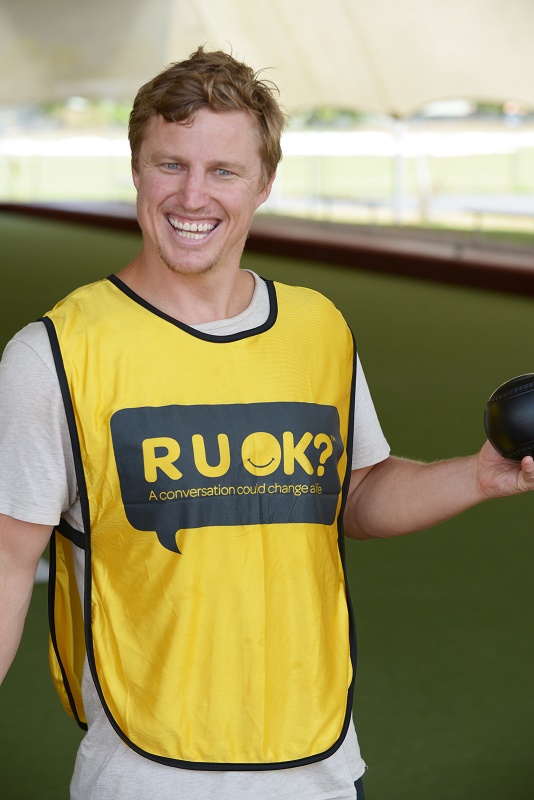
Manspeak - The importance of talking with mates
3 December 2016, 2:20PM
R U OK?
With Christmas just around the corner, celebrations, holidays and catch ups can be a time to relax and enjoy our family and friends, but it can also be a time when loneliness, personal struggles, conflict and loss can raise its head and make us feel vulnerable and disconnected. R U OK? have designed a series of videos aimed at encouraging men to get comfortable asking their mates if they’re ok. By asking and listening we can show our mates they don’t need to tackle their problems alone and reassure them that help is available. To get the conversation flowing R U OK? are sharing videos, tips and resources using the hashtag; #manspeak.
IT’S a fact that men are statistically less likely to seek help when they are struggling with life, feeling overwhelmed or suffering from mental health issues, than women.
It’s also true that some men try to manage feelings of sadness, stress and emptiness by using alcohol or drugs, withdrawing socially or avoiding situations and past times that once gave them pleasure.
Why is that?
In an ideal world, men who are struggling or in crisis would feel confident and empowered enough to ask for help. But statistics reveal that two thirds of men don’t.
Despite this, men are more likely to talk to mates before a health professional. R U OK? are keen to encourage more opportunities for men to talk comfortably with each other and normalize checking in with someone who appears to be struggling.
A beyondblue report found 50 per cent of men rarely talk about deeper personal issues with mates but almost a third wished they could open up more.
A lot of men want greater openness with their mates but don’t always have the skills to start the conversation or know how to respond when a friend opens up.
To help navigate these conversations - R U OK? have created a video series called #Manspeak.
See link:
https://www.youtube.com/playlist?list=PLEmG14uBwEvDVzj7VdEp179Z9B833d1zC
It’s a pattern that doesn’t need to end in tears.
THE latest Australian Bureau of Statistics (ABS) suicide figures for 2015 speak volumes about the need for Australian men to support and talk to each other more, before things get to crisis point.
Suicide is the leading cause of death for both men and women between the ages of 15 and 44, but men aged 85 and over accounted for the highest suicide rate in Australia in 2015 with 68 deaths, then men between the ages of 40 and 44, followed by men aged 45 to 54.
3027 people took their own lives in 2015, an increase from 2684 in 2014.
That’s eight people per day in Australia. Six of those eight are men. Someone’s dad, someone’s mate, someone’s work colleague, a man we love.
When should we check in with our mates?
The study also identified a combined set of behaviors that appeared to set men on a path to suicidal thought. Those were:
-Depressed or anxious mood
-Unhelpful or inflexible beliefs or values about themselves or their circumstances
-Avoidant coping strategies; turning away from problems because they felt unable to fix or deal with them
-Accumulated life stressors like divorce, debt, feeling trapped, loss of job, identity issues, infidelity, addiction, health, stuck in a rut, mental health problems.
Men don’t need to fix everything and they don’t need to have all the answers.
Alongside mental health professionals, the good news is that friends, family and community can disrupt the downward spiral. The following steps are key to starting and navigating a meaningful conversation.
It’s as simple as A.L.E.C.
A- Ask. Asking if they’re okay. Saying things like ‘How you tracking?’ ‘What’s happening, have you got five minutes to chat?’ ‘Mate, you don’t seem yourself, what’s up?’ ‘You’ve been out of sorts for a while, is everything okay?’ ‘Mate, my gut’s telling me something’s up with you, want to get a coffee and tell me what’s going on?’
L- Listen. Once you have gained their trust and they’ve agreed they need to talk, find a quiet place to let them open up. Listen without judgment and remember you don’t have to have the answers. Just letting someone get it off their chest can be the first and sometimes most powerful step in their help seeking journey.
E- Encourage. Encourage them to seek help. Again, it’s not your role to fix whatever’s happening in their world. It could be suggesting they book in to see their GP, talk to their boss, another family member or a mental health professional.
C- Check in. It’s important to check back in with them. Pick up the phone and follow up on your initial chat. Checking in lets them know you care about them and are committed to being there for them. It also reinforces that they matter.
Things not to say to someone who’s struggling with life:
“Chin up mate!”, “Harden up,” “Suck it up and get on with it” “Cry me a river, mate,” “You need to sort yourself out and face up to things.”
Think before you speak. Ask yourself, is what I am about to say supportive? Will it help or will it harm? Unsupportive or dismissive statements in the Aussie manspeak landscape only serves to further alienate those who are vulnerable and at risk.
What if you ask someone if they’re ok and they say no?
-Reassure them.
-Refer them to the R U OK? ‘Find Help’ page (https://www.ruok.org.au/findhelp) where a variety of services like Lifeline, beyondblue, Suicide Call Back Service and Griefline can be accessed.
-Suggest they contact their GP immediately.
Creating positive momentum by talking with mates
The study showed that helping men achieve small wins, like tackling a debt for example, helped them move forward and provided relief from feeling overwhelmed by other life stressors.
Men reported benefiting from regular contact with someone they could open up to without judgment. Those checking in could also help by encouraging their mate or loved one to avoid substance abuse which aggravates mood and coping mechanisms.
Other benefits to talking with mates included:
-Improvements in outlook by breaking up routines and boredom; getting them out of the house and involved in something.
-Increased social contact with people who matter like children, family or good friends.
-Helping others with no personal benefit to the person struggling was shown to positively impact the wellbeing of men (and women) during tough times. Things like helping a mate on a house project, coaching a team or pitching in on a repair task increased feelings of worth.
Encouraging men to open up to mates was crucial in protecting them against suicide. This is consistent with findings that social connectedness is a primary protective factor in suicide prevention and forms the evidence base for the R U OK? campaign.
Interview with R U OK? Ambassador Brett Finch.
R U OK? Ambassador Brett Finch knows the life changing consequences of a conversation with good mates. Retiring from NRL three years ago, Finch landed on his feet working for Channel 9’s much loved, The Footy Show. Life should have been sweet as the transition out of professional league and back in to the workforce for most players, can be a hard one.
Finch admits that he struggled with the loss of football.
“I definitely had some issues starting to surface after a couple of months into retirement. I realised I was struggling. Instead of speaking up, I bottled it up or I’d just make jokes about what I was going through.”
The decision to be honest and face up to his demons was one of the hardest things he’d ever done. The reaction he got publically and personally, was the complete opposite to what he expected.
“I assumed I was just going to get judgment and I was embarrassed and ashamed to speak up about the problems I had,” he said.
“But all I got was support, I got it in droves.”
“I wish I had spoken up so much sooner, my problems got worse because I didn’t. When I finally sought help, the support I got from friends, family and people on the street, was enormous.”
Finch said that the benefits of a good support network and a healthy lifestyle have been key.
“I continue to monitor myself, it’s ongoing, but I am now the healthiest I have been both mentally and physically since I retired,” he said.
“Opening up to people and allowing myself to be vulnerable has further strengthened my relationships and developed other areas in my everyday life, it’s just made it all so much better.”
As a result, Finch decided to take on the role of R U OK? Ambassador to help others who might be struggling to feel comfortable and reassured enough to seek help, or at least be receptive to an open conversation.
“Knowing how I’ve struggled, I thought being an R U OK? ambassador was the perfect fit. If I could see that same thing going on with someone else, to be able to talk with them and check in and see if they’re ok? it’s something I wanted to be a part of,” he said.
“Asking are you ok sounds so simple, almost too simple. But I can assure you it’s a powerful question, especially for men,
“I think so many of us men would rather joke about our troubles or pretend everything’s alright, but to actually sit down and say to your mate, “I’m here if you need me, are you okay? Is there anything I can do? that can be life changing, it really can.”

